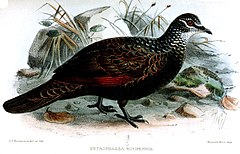Petrophassa
Wygląd
| Petrophassa[1] | |||
| Gould, 1841[2] | |||
 Przedstawiciel rodzaju – aborygenek rdzawopióry (P. rufipennis) na ilustracji autorstwa Johna Gerrarda Keulemansa z 1898 roku | |||
| Systematyka | |||
| Domena | |||
|---|---|---|---|
| Królestwo | |||
| Typ | |||
| Podtyp | |||
| Gromada | |||
| Podgromada | |||
| Infragromada | |||
| Rząd | |||
| Rodzina | |||
| Podrodzina | |||
| Rodzaj |
Petrophassa | ||
| Typ nomenklatoryczny | |||
|
Petrophassa albipennis Gould, 1841 | |||
| Gatunki | |||
| |||
Petrophassa – rodzaj ptaków z podrodziny treronów (Raphinae) w rodzinie gołębiowatych (Columbidae).
Zasięg występowania[edytuj | edytuj kod]
Rodzaj obejmuje gatunki występujące na kontynencie australijskim[3].
Morfologia[edytuj | edytuj kod]
Długość ciała 28–31 cm; masa ciała 103–160 g[4].
Systematyka[edytuj | edytuj kod]
Etymologia[edytuj | edytuj kod]
Petrophassa: gr. πετρα petra „skała”; φασσα phassa „gołąb”[5].
Podział systematyczny[edytuj | edytuj kod]
Do rodzaju należą następujące gatunki[6]:
- Petrophassa rufipennis – aborygenek rdzawopióry
- Petrophassa albipennis – aborygenek białopióry
Przypisy[edytuj | edytuj kod]
- ↑ Petrophassa, [w:] Integrated Taxonomic Information System (ang.).
- ↑ J. Gould. Fifty new species of Australian birds, and characterized the following new species. „Proceedings of the Zoological Society of London”. 8, s. 173, 1840. (ang.).
- ↑ F. Gill & D. Donsker (red.): Pigeons. IOC World Bird List: Version 9.1. [dostęp 2019-06-15]. (ang.).
- ↑ L.F. Baptista, P.W. Trail & H.M. Horblit: Family Columbidae (Pigeons and Doves). W: J. del Hoyo, A. Elliott & J. Sargatal: Handbook of the Birds of the World. Cz. 4: Sandgrouse to Cuckoos. Barcelona: Lynx Edicions, 1997, s. 155. ISBN 84-87334-22-9. (ang.).
- ↑ Petrophassa, [w:] The Key to Scientific Names, J.A. Jobling (red.), [w:] Birds of the World, S.M. Billerman et al. (red.), Cornell Lab of Ornithology, Ithaca [dostęp 2022-02-17] (ang.), [archiwum].
- ↑ Systematyka i nazwy polskie za: P. Mielczarek & M. Kuziemko: Podrodzina: Raphinae Wetmore, 1930 (1835) - trerony (wersja: 2021-04-04). [w:] Kompletna lista ptaków świata [on-line]. Instytut Nauk o Środowisku Uniwersytetu Jagiellońskiego. [dostęp 2021-07-26].
